|
|
|
Sort Order |
|
|
|
Items / Page
|
|
|
|
|
|
|
| Srl | Item |
| 1 |
ID:
182437
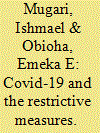

|
|
|
|
|
| Summary/Abstract |
The emergence of the COVID-19 pandemic at the onset of the year 2020 brought unprecedented suffering to humanity. Economic activities in virtually all nations across the globe were brought to a shuddering halt, with the third world suffering the worst effects on the economic front. The health security of nations across the globe was shaken, as nations came to terms with the surging health needs for the infected citizens. In order to grapple with the pandemic, nations took drastic measures, chief among them being the implementation of lockdowns, coupled with harsh restrictions. These measures, however, came at a cost. This paper explores the impacts of the restrictive measures that were implemented by the Zimbabwean government to combat COVID-19 pandemic. The paper interrogates these measures in the context of the national security discourse. In the analysis, the paper also makes reference to South Africa- a more developed nation and Zimbabwe’s neighbour.
|
|
|
|
|
|
|
|
|
|
|
|
|
|
|
|
| 2 |
ID:
182433
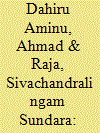

|
|
|
|
|
| Summary/Abstract |
The Economic Community of West African States (ECOWAS) was founded exclusively to focus on economic integration. However, in 1976, the Nigerian government proposed the adoption of a non-aggression protocol to regulate issues of regional collective security. The proposal was accepted in principle and the secretariat was tasked to formulate policy prescriptions for adoption of the decision organs. Using historical techniques, this article peruses existing literature, official reports and minutes of meetings of the ECOWAS authority and Council of Ministers to highlight the successes of the executive secretariat and reflect on the political, structural and security challenges that it encountered in facilitating the implementation of inter-organisational cooperation in the Liberian crisis.
|
|
|
|
|
|
|
|
|
|
|
|
|
|
|
|
| 3 |
ID:
182431
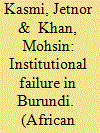

|
|
|
|
|
| Summary/Abstract |
Ethnic and land conflicts have recently gained significance in peace and conflict resolution. It is imperative to understand both endogenous and exogenous factors and their relations towards the institutional, democratic, and state-building process to mediate the risks of class and land conflicts. This paper attempts to identify historical relations of land and class structure by analysing Burundi land and class conflict and its significance for peace and stability. We found that the imbalance of land ownership and class structure in a society leads to armed conflicts, leading to an outbreak of other social conflicts, including violence, forced displacement, paralyzed land governance, and power relations changes. Hence, there is a dire need to foster reintegration and reconciliation through balanced multiple diplomacies in Burundi, enhancing state legitimacy towards sustainable land tenure security, improving state capacity, and ensuring justice in the reconciliation process, in association with local and regional powers.
|
|
|
|
|
|
|
|
|
|
|
|
|
|
|
|
| 4 |
ID:
182432
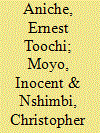

|
|
|
|
|
| Summary/Abstract |
The ‘coloniality’, porosity, and ‘ungovernability’ of borders in West Africa, have engendered undocumented migration, in which most people engage to visit their kin and for economic reasons such as herding, farming, fishing, hunting, and trading. This occurs concurrently with human smuggling, human trafficking, gun-running, terrorism, and money laundering. The rise in these cross-border criminal activities and the resultant insecurity have put irregular migration into the mainstream of political and academic conversation, generating national, regional, and global concerns. Against this backdrop, this paper examines the nexus between irregular migration and insecurity along ‘ungoverned’ borders in West Africa, based on a review of relevant literature on migration, security, and governance in scholarly journals, books as well as relevant reports, newspaper, and media accounts. The overarching question which this raises and is addressed in this paper is: How does the coloniality and porosity of ungoverned borders in West Africa engender and/or entrench cross-border insecurity? Addressing this question suggests the need to provide sufficient governance mechanisms that involve both state and non-state actors in order to reduce the ungoverned spaces in this part of Africa.
|
|
|
|
|
|
|
|
|
|
|
|
|
|
|
|
| 5 |
ID:
182430
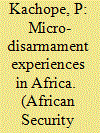

|
|
|
|
|
| Summary/Abstract |
Micro-disarmament, which refers to the removal of small arms and light weapons (SALW) from the civilian population, is one of the recent international policy frameworks through which the global challenge of illicit gun proliferation has been approached. Although Africa still grapples with this challenge, a number of successful micro-disarmament programmes have been implemented from which important lessons can be drawn. One such success story has been the disarmament of pastoral communities in the Karamoja region of north-eastern Uganda under the Karamoja Integrated Disarmament and Development Programme (KIDDP). This paper argues that even though micro-disarmament success may be context specific, there are generic conceptual and practical lessons that should be learned from the KIDDP. Particularly, the paper argues that a human security approach anchored on a well-coordinated multi-actor structural framework is an essential lesson from the KIDDP which can benefit the rest of the African communities still grappling with the management of small arms infiltration.
|
|
|
|
|
|
|
|
|
|
|
|
|
|
|
|
| 6 |
ID:
182435
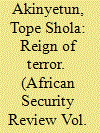

|
|
|
|
|
| Summary/Abstract |
Few days after Nigeria attained the sexagenarian status on October 1, 2020, the country has once again become a subject of unusual discourse both home and abroad. This is due to the protests by disgruntled youths against the activities of the Special Anti-Robbery Squad; a unit of the Nigeria Police Force, which has been accused of brutality, human rights violation, sexual abuse, torture, and extrajudicial killings among others. This study adopts a qualitative approach which draws data from reports of reputable international organisations, juried scholarly articles, working papers, and newspaper articles. The study concludes that the police adopts brutality, abuse, and violations as its tactics due to its inadequate equipment for investigation which makes officers deploy torture as a means of extracting the truth. This is further complicated by an ingrained culture of corruption, inadequate funding, political interference, inadequate personnel, and a pro-elite orientation. As a result, it is recommended that a sincere and comprehensive reform of the police be carried out to improve the welfare of the police; encourage the use of extensive technology, and improve police-community relations.
|
|
|
|
|
|
|
|
|
|
|
|
|
|
|
|
| 7 |
ID:
182436


|
|
|
|
|
| Summary/Abstract |
After decades of diplomatic disengagement from Africa, Russia is making a strong bid to facilitate bilateral relations with more African states. Many analysts regard this as an attempt to project power and influence outside of Russia's immediate borders in Eastern Europe and to whittle down the West's influence in Africa. The deepening ties between Russia and African states have led to the incursion of Russian political operatives and disinformation experts who have meddled in the political and electoral processes of countries such as Zimbabwe, Mozambique and the Democratic Republic of the Congo. However, while Russian election interference in advanced western democracies has attracted extensive scholarly interest, similar meddling by Russian agents on the African continent has been subject to little scrutiny. This article sheds light on the methods used by Russian political operatives to meddle in elections in Africa. It concludes that Russia's renewed interest in Africa could have grave consequences for democracy on the continent if left unchecked.
|
|
|
|
|
|
|
|
|
|
|
|
|
|
|
|
| 8 |
ID:
182429


|
|
|
|
|
| Summary/Abstract |
In this edition, as in others, we focus on some persisting trends that emphasise the gravity of security challenges in Africa, but also succeed in showcasing the successes of some security mechanisms that are causes of optimism and sources of good practices. The current security situation in Africa continues to be characterised by instability in some spaces with several threats to socio-economic development and the general well-being of people being affected by violent conflict. In all cases, as highlighted in this edition, the transnational nature of conflicts requires a collective response involving states and institutions as stakeholders to find solutions and to act against perpetrators to protect people, infrastructure, and assets.
|
|
|
|
|
|
|
|
|
|
|
|
|
|
|
|
| 9 |
ID:
182434
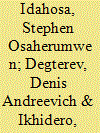

|
|
|
|
|
| Summary/Abstract |
Security in the Sahel region has traditionally been studied through a realist prism, emphasising military concerns and the pre-eminent influence of great powers in shaping local security concerns. The paper reviews the securitisation initiatives in Africa's Sahel. It specifically explores Buzan and Waever's ‘securitisation' framework to re-evaluate securitising discourse and the contemporary initiatives of the EU, France and the U.S.A. in the Sahelian States. Its main observation is that the central security actors in the Sahel have over the years paid less attention to the securitisation of threats in the region. The paper provides indicators of successful securitisation, which includes but goes beyond speech acts. It underscores the reality that though the securitisation of Africa's Sahel has helped to legitimise the ‘war on terrorism', it has very little to offer for Africa’s development problems. The paper posits that securitisation, though a laudable initiative, does not sufficiently address root causes of terrorism, which are not military but social and economic. It thus recommends a holistic approach to addressing the security challenges in the Sahel; which must include: providing increased safe access for those who want to work in the West while also assisting to create economic prospects and opportunities in the region.
|
|
|
|
|
|
|
|
|
|
|
|
|
|
|
|
|
|
|
|
|